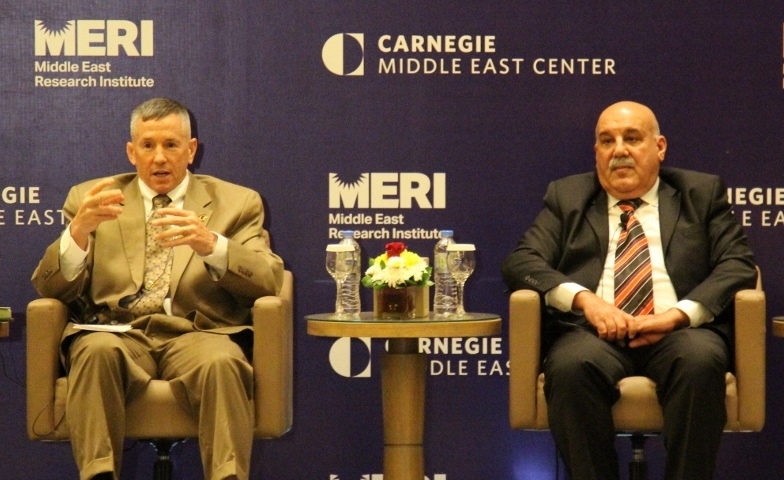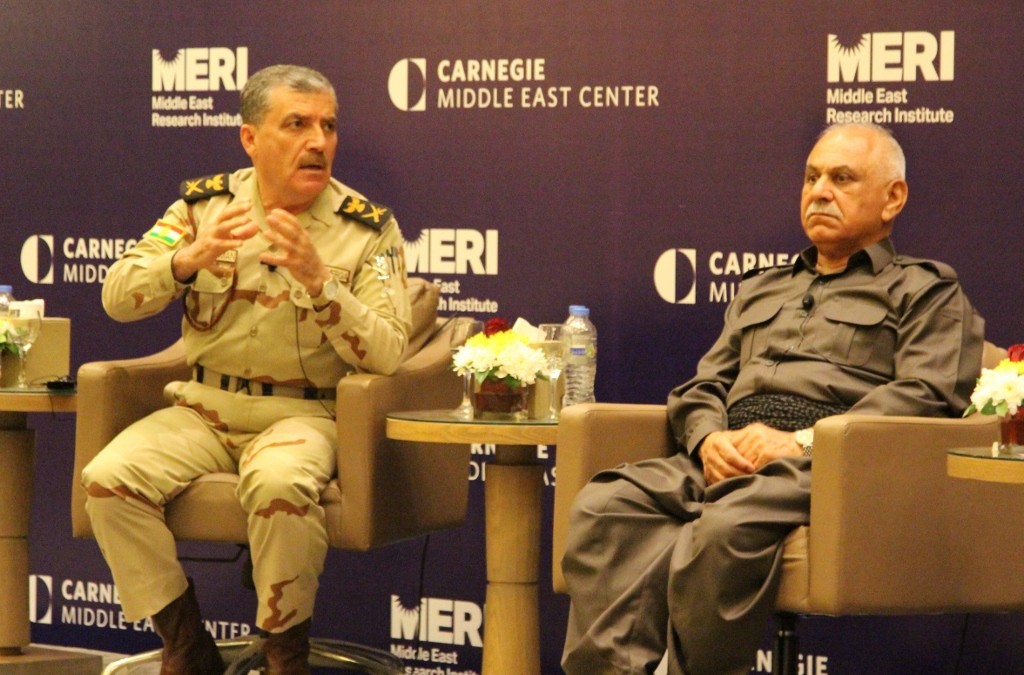“The institutionalisation of the Peshmerga is a much needed imperative without which the war against ISIS and the deepening of democracy and nation-building in the Kurdistan Region are bound to suffer.” This was the collective consensus engendered in a high-level conference organized by the Middle East Research Institute (MERI) and Carnegie Middle East Centre involving key officials from the Ministry of Peshmerga, the American High Command in Iraq, and academic and subject experts. The Conference titled, ‘The Future of Armed Forces in a Democratic Kurdistan Region’ served as a launching pad for MERI’s project on the institutionalisation of the Peshmerga Forces.
The conference deliberations highlighted that while the courage and bravery of the Peshmerga in staving off the threat of ISIS has been recognized locally and internationally, much more needs to be done in order to streamline the Ministry of Peshmerga so that it functions as a single, coherent unit. One of the most problematic issues is the divisiveness of the Peshmerga forces as they stand splintered and divided on party lines with virtually two separate entities, one KDP and the other PUK. The Ministry of Peshmerga was established in 1992 but it was only in 2010 that steps relative to the unification of the Ministry of Peshmerga were undertaken stated Jabar Yawar, Secretary General, Ministry of Peshmerga. He highlighted the fact that though the process of the unification of the Peshmerga has been slow, a strong political will existed to drive the momentum of unification forward.
The deepening of the processes of unification and professionalisation entails efforts that are multi-faceted and require work in a number of different directions. MERI President, Professor Dlawer Ala’Aldeen, emphasised two challenges that lie at the heart of Peshmerga’s institutionalisation: first, there is a visible gap and shortage in command and control (C2) and second, there is a lack of management, professional development and leadership. This can be improved through the initiation of a performance management system and confidential assessment reports in order to guarantee optimum results. While the ghost of internal warfare has disappeared in the KRG, what we need is ‘progress by design’ in order to fast-track the process of institutionalisation, MERI President asserted.
In essence, it is important that immediate exigencies should not allow for the key tasks of institutionalisation to be delayed. MERI believes that while the financial crisis in the KRG, relations between Erbil and Baghdad, and the existential threat posed by ISIS are key factors impacting the Peshmerga, these should not allow for or be made an excuse in order to forestall the much-needed forward momentum to institutionalise the Ministry of Peshmerga. A strategic vision and framework outlining a road-map for the future is needed in order to devise a policy for the longer term. It is critical for the KRG to draw on its own indigenous resources and legacies as copying and pasting solutions from the experience of other states cannot be simply done, reasoned Dr. Yezid Sayigh, Senior Associate, Carnegie Middle East Centre.
MERI’s project on the institutionalisation of the Peshmerga entails a long-term effort catering to a research focused, policy oriented study on professionalizing the Ministry of Peshmerga through sustained advocacy and critical engagement. The term institutionalisation embraces key technical, operational, performance oriented, strategic, planning, and financial variables that MERI’s holistic research will take into account. A sound footing is already in place with cooperative assurances from the Ministry of Peshmerga which has come forth in accepting MERI’s role and efforts towards this end.
Related Media:
-
The Future of the Armed Forces in a Democratic Kurdistan Region – Session 1
-
The Future of the Armed Forces in a Democratic Kurdistan Region – Session 2
* * * * *
About MERI: The Middle East Research Institute is Iraq’s leading policy-research institute and think tank. It is an independent, entirely grant-funded not-for-profit organisation, based in Erbil, Kurdistan Region. Its mission is to contribute to the process of nation-building, state-building and democratisation via engagement, research, analysis and policy debates.
MERI’s main objectives include promoting and developing human rights, good governance, the rule of law and social and economic prosperity. MERI conduct high impact, high quality research (including purpose-based field work) and has published extensively in areas of: human rights, government reform, international politics, national security, ISIS, refugees, IDPs, minority rights (Christians, Yezidis, Turkmen, Shabaks, Sabi mandeans), Baghdad-Erbil relations, Hashd Al-Shabi, Peshmarga, violence against women, civil society. MERI engages policy- and decision-makers, the civil society and general public via publication, focused group discussions and conferences (MERI Forum).



